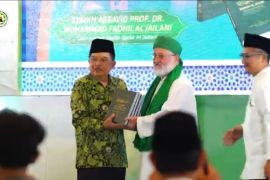SINGAPORE, Apr 20, 2015 - (Antara) - Singapore is set to continue to benefit from economic growth across the ASEAN region as global firms seek to establish a presence in Southeast Asia, many choosing Singapore as their regional headquarters, according to JLL's upcoming research report 'The Emerging Powerhouse of Southeast Asia: What does it mean for Real Estate Investors?'.
The report, which will be released following the World Economic Forum East Asia meeting taking place in Jakarta from 19-21 April, also highlights how a rising middle class, urbanisation and competitive labour costs in Southeast Asia will benefit the real estate markets of Jakarta, Manila and Bangkok.
Chris Fossick, Managing Director JLL, Southeast Asia said: "Singapore's office markets have been buoyant for the past three years, as continuing regional growth has driven companies to establish a presence in the city state. This is reflected in the strong demand we are seeing for grade A office space, which is in turn driving construction. The strength of occupier demand, existing and forecast, means we are seeing a great deal of investor interest in office assets in Singapore, which is resulting in competitive bidding on investment transactions."
The ASEAN effect
This year marks the creation of the ASEAN Economic Community (AEC), a single market of over 600 million people. This large economic and population bloc has already translated to significant opportunities through increased inter- and intra-regional trade, tourism, expanded financial and insurance services and higher demand for logistics, according to the report.
Southeast Asia, notably Vietnam, Myanmar and Thailand, has served as a low cost alternative to China. An additional 8 million people per year will be making the rural to urban migration across Southeast Asia by 2020, helping to push the urbanisation rate for the region to above 50 per cent, from 47 per cent today. The region's middle class is expected to grow by another 70 million by 2020, as highlighted in the paper.
These trends are expected to lift demand for real estate, especially for retail space in Bangkok, offices in Manila and residential and logistics assets in Jakarta.
- Domestic consumption is rising in Indonesia in tandem with solid economic growth, rising urbanisation and wealth levels. Rising rental yields and the potential for capital appreciation have led to considerable interest from local and foreign investors and many are looking to acquire land within established industrial estates in the Greater Jakarta area.
- In Manila, locators have taken up a large volume of office space as the city develops as an outsourcing centre.
- In Bangkok, a more stable political environment following the military coup in May 2014 has given landlords and occupiers greater motivation to renew their contracts. Despite an aging population, Thailand has a large middle class, which has strong buying power.
- Southeast Asia's stable economies, supported by a recovering US, will support the Singapore office market in the long term despite an expected large supply of completions in 2016/2017
- Myanmar's real estate is benefitting from booming visitor numbers. While there is interest from institutional investors with higher risk appetite, mainstream investors still find the political landscape and land ownership structure too challenging, according to the report.
Dr. Chua Yang Liang, head of research for JLL in Southeast Asia and author of the report commented: "While limited real estate assets across the region make direct investments challenging, investors have benefitted from the growth of the retail market through joint ventures with local partners or direct participation in the equity market."
Chris Fossick concluded: "In the short term, there are many enabling factors that will help shape the property markets across Southeast Asia. Amidst this potential, some ASEAN countries still face challenges of transparency, legal and political risks. Nonetheless, selected areas have seen improvement in recent years and some risks can be mitigated."
'Southeast Asia's Emerging Powerhouses: what it means for real estate investors' will be the first in a series of white papers from JLL in 2015, analysing the impact of the macro-economic and political environment on real estate markets in Asia Pacific. For more information on research from JLL in Asia Pacific please visit http://www.ap.jll.com/asia-pacific/en-gb/research.
About Jones Lang LaSalle
JLL (NYSE:JLL) is a professional services and investment management firm offering specialized real estate services to clients seeking increased value by owning, occupying and investing in real estate. With annual fee revenue of $4.7 billion and gross revenue of $5.4 billion, JLL has more than 230 corporate offices, operates in 80 countries and has a global workforce of approximately 58,000. On behalf of its clients, the firm provides management and real estate outsourcing services for a property portfolio of 3.0 billion square feet, or 280.0 million square meters, and completed $118 billion in sales, acquisitions and finance transactions in 2014. Its investment management business, LaSalle Investment Management, has $53.6 billion of real estate assets under management. JLL is the brand name, and a registered trademark, of Jones Lang LaSalle incorporated. For further information, visit www.jll.com.
JLL has over 50 years of experience in Asia Pacific, with over 29,000 employees operating in 81 offices in 16 countries across the region. The firm was named 'Best Property Consultancy' in seven Asia Pacific countries at the International Property Awards Asia Pacific 2014, and won nine Asia Pacific awards in the Euromoney Real Estate Awards 2013. www.jll.com/asiapacific.
Contact:
Madeleine Little
+65 6494 7003
madeleine.little@ap.jll.com
Reporter: PR Wire
Editor: PR Wire
Copyright © ANTARA 2015











